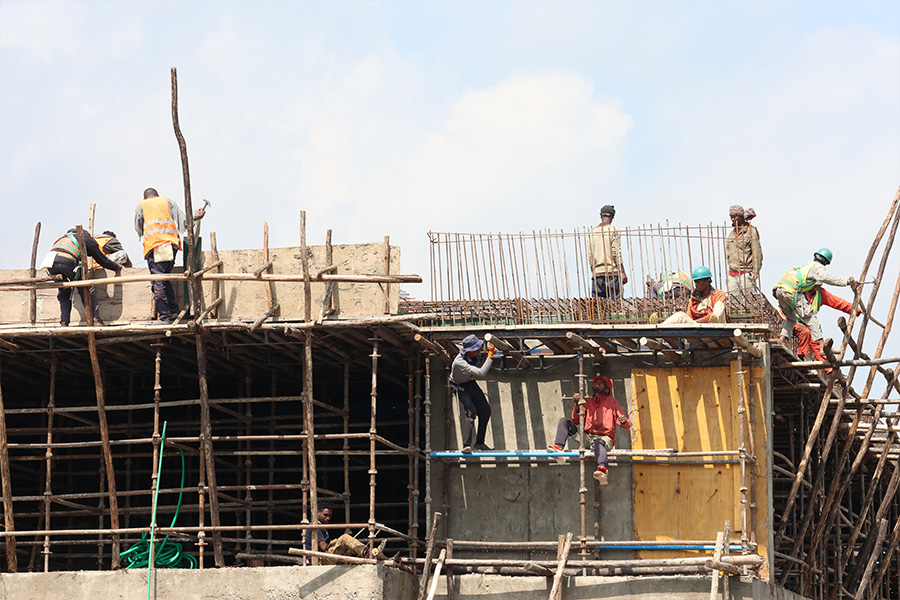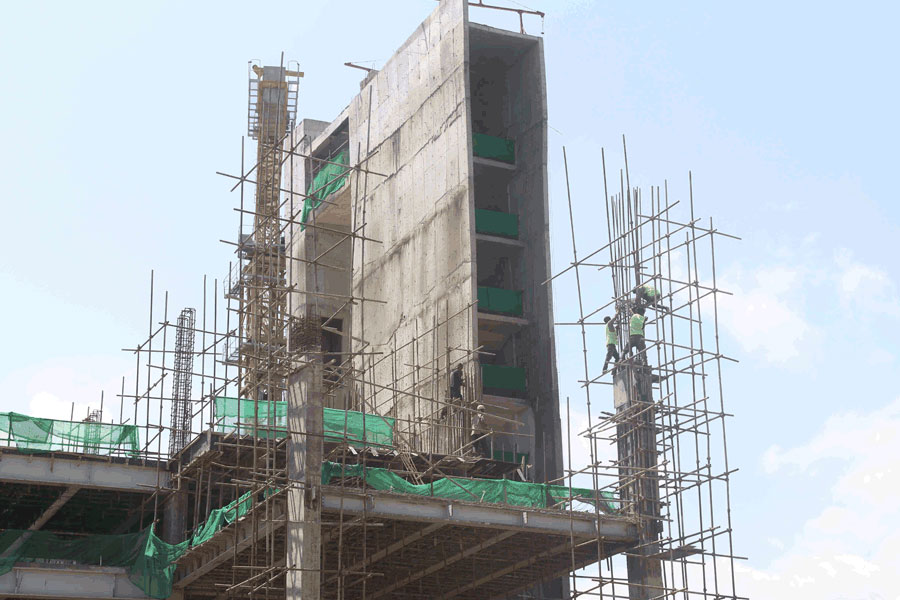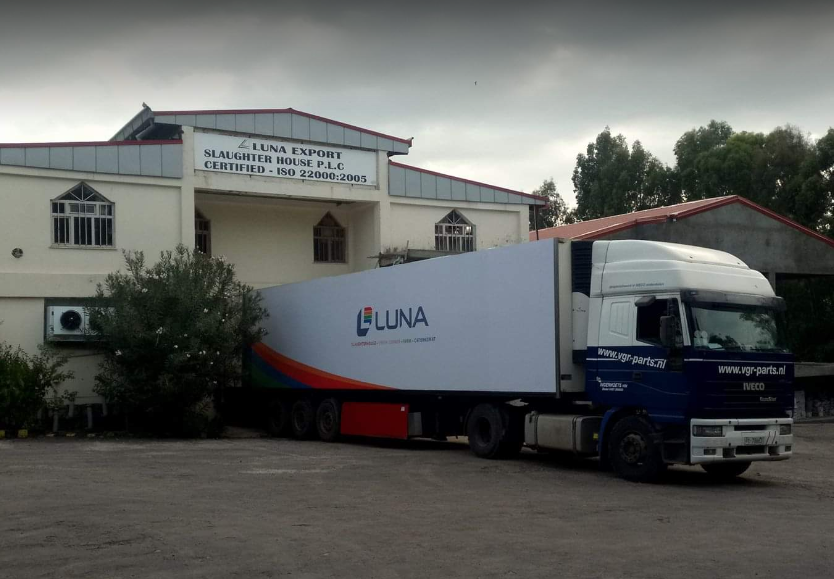
In-Picture | Oct 12,2024
Adema Alana Alaho, a 28-year-old father of four, suffered a major injury at a new building construction site around Laphto Mall, Nifas Silk Laphto district on March 19, 2019.
Adema had come from Wolayita Sodo some five months earlier searching for work, leaving behind his wife and four children at home.
Around 10:00am on that fatal day, the morning started routinely at the 16-storey apartment project site that is under construction by the developer Raycon Construction until an accident occurred on the 14th floor, causing construction material and debris to cascade down to the lower floors, including past the 10th floor where Adema was chiseling the concrete openings of a lift shaft with other fellow workers.
"Suddenly the scaffoldings broke apart and fell down, taking with it all the structures to the basement," Adema told Fortune during a visit at African Leprosy Research (ALERT) Hospital, where he is recovering from his injuries.
There were two fatalities that day. Adema’s coworkers were working on chiseling the concrete shaft on the ninth floor, when they were carried to their death in the basement below among a heap of lumber, metal and other construction debris that crashed upon them, according to Adema.
Adema and the other victims, including 26-year-old Asella Alemu, were taken to ALERT Hospital for emergency treatment.
Assela was working on the 11th floor and survived with minor injuries. He went home after receiving initial treatment at the hospital. But Adema was hospitalised as a result of major injuries he sustained.
“He had a broken right hand and scalp lacerations when he arrived at the trauma centre of the hospital,” said Yonatan Fekadu (PhD), a general practitioner at ALERT Hospital.
Later on, his wounded scalp became infected and additional treatment was needed that took more time to heal, and he may need plastic surgery, according to Yonatan.
At the accident site, Fortuneobserved that some workers have been wearing slippers and plastic shoes, while others work without helmets. When asked, workers replied that they do not feel comfortable wearing helmets as it makes them hot.
“The company does not provide protective gear to contract workers as they do not stay long enough with the company," said Kiyab Driba, foreman at the construction site. "The company only provides safety gear such as helmets, reflector vests and belts for permanent employees.”
Management of the construction company was not immediately accessible for comment.
Police and workers survey a construction accident in front of Flamingo Hotel on Bole Road.
When the accident occurred, people around the area reported to the emergency services, the City's Fire & Emergency Prevention & Rescue Authority (FEPRA), and a crew arrived at the scene soon after the accident.
“When the fire crew arrived at the accident site, we learned that 15 people were chiseling the lift shaft openings on different floors,” said Nigatu Mamo, communications director at the FEPRA. “The scaffolding was the main causes of the accident, as it was were not assembled properly.”
One of Raycon Construction's supervisors at the construction site told Fortune that the victims were contract workers hired to chisel the lift shaft openings and have been working there for nearly a month.
Globally, over 7,600 people die each day from work-related accidents or exposure, which is over 2.8 million fatalities every year, according to the International Labour Organisation, which says that these deaths could and should have been prevented.
In the capital, accidents related to construction activities have risen every year. The Authority registered 102 deaths and 100 injuries in the past eight years.
Most of these accidents were encountered during the construction of buildings, roads and soil excavation, according to Nigatu.
Just in the past seven months of the current fiscal year, the number of deaths has increased to seven, while three deaths have been registered during the entire previous fiscal year.
"Scaffolding and formwork failures are the most common causes of accidents, followed by a lack of personal protective equipment," he said.
There is no specific and full-fledged policy in the country dedicated to occupational health and safety rules, but they are implemented using proclamations, directives and standards ratified by various governmental institutions.
Some of them include the Occupational Safety & Health Directive, adopted in 2008; Labour Proclamation ratified in 2003 and amended in 2006; Proclamation for the Private Employment Agency of 1998; and Proclamation Concerning the Rights of Disabled Persons to Employment of 1994.
There are also some articles in the Constitution of Ethiopia that mention the safety and health issues of citizens as well.
In the labour law, occupational health and safety issues are only briefly discussed in some articles, according to Zerihun Gezahegn, an adviser to the state minister of Labour & Social Affairs Ministry.
Internationally, Ethiopia has been a member of the International Labour Organisation, ILO since 1923, has ratified 23 conventions, which comprise eight fundamental conventions, 14 technical conventions and one priority or governance convention, according to an ILO source.
ILO conventions are minimum standards set by the ILO that should be a right for every worker all over the world. It is a tripartite organisation consisting of trade unions, governments and companies and is part of the United Nations system.
The Ethiopian Standard Agency has also adopted a voluntary standard, ISO 45001, Occupational Health & Safety Management Systems and Requirements, that will help organizations improve employee safety, reduce workplace risks and create better, safer working conditions.
"Even though the Agency adopts the standard, the country is still far behind in implementing it," says Tadele Kumie, a management systems consultant at Integrated Quality Solutions Plc, "compared with others such as food and environment management systems."
At least the food and environment sector has shown some progress, because the standards have become mandatory, according to Tadele.
There are efforts carried out by the Addis Abeba City Construction and the city's Labour and Social Affair Bureaus as well as the Addis Abeba City Integrated Infrastructure Development, Construction Permit & Control Authority to address worker safety in the construction sector.
The Authority compels private construction projects to incorporate costs necessary to implement the Occupational Health & Safety requirements to get a construction permit. The city's Construction Bureau does the same for public projects.
To bring this into reality, the construction bureau has completed drafting a new regulation for occupational health and safety for construction workers and has sent the draft to the city council for approval and is likely be enacted in two months.
The regulation includes responsibilities to be considered by consultants, contractors, sub-contractors, designers and workers during construction projects. It also considers how occupational health and safety guidelines can be included in the design, the tender documents and during contract administration.
The bill was up for discussion and review by stakeholders, including professionals from the city’s labour and social affairs bureau, professional associations and industry players like contractors, architects and consultants.
The city's Social & Labour Bureau, which is organised at district levels, also handles awareness creation training for private and public organisations on occupational safety and health depending on the type of hazardous situation the organisations may encounter and to help establish safety officers in their respective places.
They also control and correct safety irregularities raised in the workplaces. The Bureau also has an obligation to give a detailed accident investigation report to law enforcement bodies during accidents.
Random and scheduled site inspections are conducted to check on how the contractors and consultants are implementing occupational health and safety directives.
But, in most cases, the results are disappointing, according to them.
Workers are not aware of the need to wear protective clothing, and the contractors do not require them to wear them, they claim.
In the first seven months of the current budget year, 13 organisations have requested awareness training, studies of the type of hazards the organisations face and the requirements for safety precautions, according to Marqos Admasu, an expert on occupational safety & health at the city's Labour & Social Affairs Bureau.
Even though they are small in number, there are some private construction companies such as Tekleberhan Ambaye Construction (TACON), Afro Tsion and Zamra that have already started implementing occupational health and safety measures at their construction sites and set up separate health and safety departments that deal with safety issues.
TACON has organised an Occupational Safety, Health & Environment department at its main office and prepared guidelines to provide training to the staff on construction safety and disposal of expired chemicals, according to Goitom WoldeGabriel, deputy CEO of TACON.
Getaneh Retta, general manager of GERETTA Consulting Architects & Engineering, a company that had overseen the construction of the Oromia Cultural Centre Haile Resorts, Century Mall and Marathon Motors Assembly Plant, emphasises the need for awareness creation on the issues of occupational safety.
Tadele Sime, a management systems consultant, wishes to focus on National Quality Standards Policy that would harmonise and bind all types of occupational safety and health hazards in different sectors.
A civil engineer for three decades, Abebe Dinku (Prof), recommends making Occupational Health & Safety laws mandatory.
"Contractors and consultants have to be certified and must secure professional indemnity insurance, which could cover accident costs," said Abebe.
After weeks of treatment, Adema has completed surgery on his scalp and was dismissed from the hospital at the beginning of last week. His hands in a cast, he is told to come back after 15 days for a checkup.
PUBLISHED ON
May 11,2019 [ VOL
20 , NO
993]

In-Picture | Oct 12,2024

Fortune News | Sep 02,2023

Addis Fortune | May 04,2024

Fortune News | Mar 14,2020

Radar | Dec 05,2018

Dec 22 , 2024 . By TIZITA SHEWAFERAW
Charged with transforming colossal state-owned enterprises into modern and competitiv...

Aug 18 , 2024 . By AKSAH ITALO
Although predictable Yonas Zerihun's job in the ride-hailing service is not immune to...

Jul 28 , 2024 . By TIZITA SHEWAFERAW
Unhabitual, perhaps too many, Samuel Gebreyohannes, 38, used to occasionally enjoy a couple of beers at breakfast. However, he recently swit...

Jul 13 , 2024 . By AKSAH ITALO
Investors who rely on tractors, trucks, and field vehicles for commuting, transporting commodities, and f...

Jul 12 , 2025
Political leaders and their policy advisors often promise great leaps forward, yet th...

Jul 5 , 2025
Six years ago, Ethiopia was the darling of international liberal commentators. A year...

Jun 28 , 2025
Meseret Damtie, the assertive auditor general, has never been shy about naming names...

Jun 21 , 2025
A well-worn adage says, “Budget is not destiny, but it is direction.” Examining t...